Events
Speeches
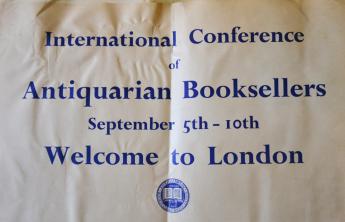
ABA NEWSLETTER
SPECIAL ISSUE
Published to Commemorate the
THIRD INTERNATIONAL CONFERENCE OF ANTIQUARIAN BOOKSELLERS
London, September 4th to 10th, 1949
The Executive Committee of the Antiquarian Booksellers' Association take pleasure in issuing a special number of the NEWSLETTER to commemorate the THIRD INTERNATIONAL CONFERENCE OF ANTIQUARIAN BOOKSELLERS which took place in London from September 4th to 10th, 1949. In their opinion it was an occasion of which the Association may feel justly proud. It was undoubtedly a tremendous success and it is proper that a complete account of it should be published as a permanent record for the Association's archives and as a memento for all members.
The Committee are sure that the whole Association would wish that the names of the Conference Sub-Committee should be published, so that due recognition may be given to their untiring work and enthusiasm. They were Miss Winifred Myers, Mr. Ifan Kyrle Fletcher, Mr. Percy Muir, Mr. Lionel Robinson and Mr. Stanley Sawyer.
C. D. MASSEY
President.
Reports of the speeches during the Conference have appeared in several issues of THE CLIQUE, and we are indebted to the Editor for permission to print them here.
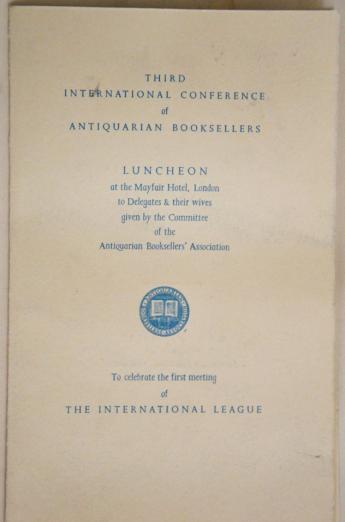
RECEPTION AT THE MAYFAIR HOTEL
At 10.30 a.m, on Monday, September 5th, some sixty visitors from overseas attended an informal reception at the Mayfair Hotel, and were welcomed by their British confreres to the Third International Congress of Antiquarian Booksellers (the first Conference held under the auspices of the International League of Antiquarian Booksellers). Altogether there were about one hundred and twenty persons present.
MR. C. D. MASSEY, President of the A.B.A., said:
Mr. Presidents, Ladies and Gentlemen,
It is with very great pleasure that I welcome you all to the Third International Conference. To our visitors from overseas I extend a welcome, not only to the Conference, but to London. As President of the Antiquarian Booksellers' Association, I feel it is an honour to welcome you on behalf of all the members of my Association, as our guests. The British Association is well aware of the importance of this occasion. It is the first time in our history that an International Conference of Antiquarian Booksellers has been held in the British Isles. The idea of the Conference started in Amsterdam, and members of my Association who attended the first one there will long remember the warm hospitality they received. I was fortunate enough to be a delegate at the second Conference in Copenhagen - lovely Copenhagen - and therefore can speak from personal experience of the wonderful hospitality we received from the Danes. It was also a memorable occasion because it was there that the League was formed. And now in London the British Association has been privileged to be chosen to hold the first Conference of the League. It is an honour which the A.B.A. deeply appreciates - we are the oldest Association and we acknowledge with gratitude the courtesy of the President and Officers of the International League has shown us in selecting our country for the League's first meeting.
Before the work of the week begins I would like to remind you of something that was said in Copenhagen last year. If I remember aright, the League was referred to as a baby because it was born there. Well, now the League is one year old and babies of that age ask for what they want. I speak with some experience. The League, however, is different. The League can ask for nothing. It is we, the ten begetters of the League, who must do the asking, but we must remember the infant's age and I urge all of us not to ask too much at first, not to put forward too many ambitious schemes; but let us work together to achieve the many useful objects for which the League was originally destined. I want to make it perfectly clear that the A.B.A. welcomes the League. We appreciate the many important projects it has on hand and the collective good it can do for all the Associations. It is obvious to all enlightened persons that the more frequently different countries get together, exchange ideas and make friends, the more widely will knowledge and goodwill be disseminated.
In welcoming all countries belonging to the League I must add our welcome to the American Association, newly formed in New York. We have the great good fortune in having as our guest and as an observer at the Conference, the President of the American Association - Mr. Gomme. My Association has always had a large number of American members, and we are delighted that America has formed an Association of her own. I am sure all of us here to-day wish that body the very best of success.
l now declare the Conference open. May it be as successful as the first two. May it leave impressions of friendliness and goodwill on all who take part in it. I speak on behalf of all members of my Association, whose united good wishes go out to its success. I feel deeply honoured in being privileged to address you on this historic occasion in the history of our Trade.
LUNCH AT THE MAYFAIR HOTEL
MISS W. M. MYERs, Vice-President of the A.B.A.:
I feel it a great privilege and honour to welcome on behalf of the A.B.A. this great gathering of delegates to the Conference of the International League of Antiquarian Booksellers. With memories of the wonderful hospitality accorded us in Amsterdam and Copenhagen, we in England have a great tradition to follow and we shall do our best to make your week a happy and fruitful one. Among our distinguished colleagues we are especially happy to welcome among us Mr. Laurence Gomme, President of the newly-formed American Association, whose advice will be truly valuable. We hope that our American colleagues will soon find it possible to join the League and so make it really representative of our great calling. It is very delightful to renew so many friendships begun in Holland and Denmark, and we are sure many new ones will spring from this London Conference. Books know no frontiers, and that is why this Conference of Antiquarian Booksellers will transcend all difficulties of language and will be a meeting of colleagues come together to discuss problems common to us all and to attempt some kind of solution. Once more I would like to say how happy we are to have you with us, and to wish this Conference every success.
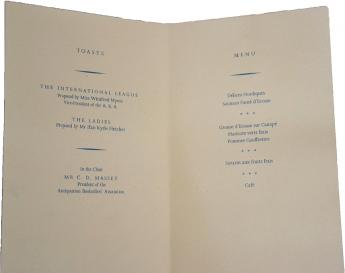
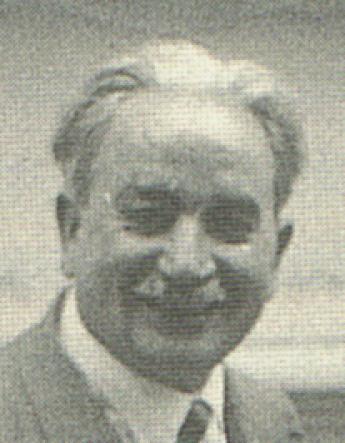
Response by M. ANDRE POURSIN, of the French Association:
Ladies, Presidents, my dear colleagues,
It is with very great pleasure that at the request of our dear President of the League of International Antiquarian Booksellers, William Kundig, I offer our warmest thanks to the A.B.A. who have just, in the person of their Vice-President, Miss Myers, given us such a cordial welcome.
May I also thank most warmly your distinguished President, Mr. Massey, with whom we are so happy to work; our old friend Mr. Percy Muir, whom we have had the pleasure of meeting in so many different countries; all your Committee and the members of the A.B.A. who have made this gathering possible. Dear A.B.A. colleagues, you have so freely offered us your hospitality and a programme planned with fraternal attention. We are indeed happy to be with you in your own country and to be here to work with you.
We are happy to be here because you all know that the antiquarian bookseller is the most independent of free men; we are glad that the first Conference held under the auspices of the International League, this league we have all formed of our own free will, should be held here in London, the capital of free England, so shortly after those immortal days when this country, this city, was the last and victorious bastion of liberty.
We are happy to be here with you because all of us here will see old friends, and when we go back we shall be able to identify a face, a personality, with their signatures; signatures that are often known, even in the antipodes, of colleagues with whom we have often done business and already esteem but whom we shall now know in a new light.
We are delighted that it is with you as guides that we are to renew our acquaintance or make acquaintance for the first time with your great and magnificent capital, your museums, your universities, your palaces and this enormously interesting centre of life. We are so pleased to come here to work with you because we feel that your atmosphere of frank cordiality will be most propitious for our work.
The International League of Antiquarian Booksellers is in its infancy. Created by our common desire to know one another better, and to promote antiquarian bookselling in a comprehensive movement of initial goodwill, the League will only flourish through the sustained goodwill we give it and the uses we make of its services. All this supposes an efficient co-operation and I think that the background of friendliness which you, our colleagues of the A.B.A., have created around your guests will be the best guide to this efficiency. And now, having wished the International League of Antiquarian Booksellers sure guidance for its future business in this third Conference, we wish the highest prosperity to the A.B.A.
DINNER AT THE GUILDHALL LIBRARY, CITY OF LONDON
September 5th, 1949
M. KUNDIG, President of the International League:
My Lord Mayor, Ladies and Gentlemen,
I am deeply moved by the honour which has been done to me by the opportunity to preside at dinner in this historic Palace of the Guildhall, and it is for me a pleasant duty to thank the City of London, in the person of its Lord Mayor, for the distinction conferred on us all this evening. Others will speak to you later of the immortal glory of the City; I desire only to tell you of the bonds by which I am attached to it, very personal bonds as you will hear, for although I am a republican on the Continent, I am a royalist in England; and in the City I feel myself one of its citizens. In fact, I am no newcomer here. It is not far short of 50 years since that great Englishman, Edward Whymper, the famous alpinist who conquered the Matterhorn and who was a kind of guardian to me, brought me for the first time to the City, on Ludgate Hill where he had a studio. Like all the respectable gentlemen of his time, surmounted by a chimney-pot hat, he bore an umbrella crooked upon his arm. He wore continually an earnest expression and smoked continually a pipe which was a frequent cause of embarrassment to him, especially in buses (which were then horse-drawn), because he insisted upon smoking it inside the bus, which was strictly forbidden. In his company I saw for the first time St. Paul's and the great monuments of the City, but above all, my eyes shone with admiration before the superb steam engines, green and gold, which traversed Ludgate Hill, a spectacle at least equally impressive for a youngster with those of her stationary monuments.
Later, as soon as I left College, I was sent to London to learn English. At this happy period (I speak of 1910), there was no question of passports nor of work permits. Pound notes were unknown (except, of course, in Scotland). Elsewhere the magnificent gold coins, bearing the image of St. George, circulated freely; bank cashiers did not count the silver coins, they weighed them out on scales, a complete novelty to a little raw provincial such as I was.
Drawn by a vocation which was my life's work, I was entered as an apprentice at the modest wage of twenty shillings a week, in the second-hand department of a large bookshop in Fetter Lane, quite near to Fleet Street. The head of this second-hand department (he has been dead for many years - before the war of 1914) was called Cribb. I was his only assistant, which means that we had many opportunities for talking, and he expounded to me the mysteries of the City of London, of which he was a true citizen, for he not only worked, but, a greal rarity-even at that time - he also lived in the City. There was for him nothing beyond the City; he believed that the jungle lay on the west side of Temple Bar. Whenever he sent me after a book in the Charing Cross Road, he furnished me with all kinds of detailed instructions, warned me against the dangers I was incurring in those outlandish parts and never failed to ask if I had the few pence necessary in case I was overcome by thirst.
He made me familiar with all the architectural beauties and grandeurs of the City, and with its most secret and curious corners. He made me visit its churches and great buildings, but he also took me to the most typical English restaurants, to those, for example, where the lawyers from the Courts of Justice snatched a hasty lunch, still wearing their wigs; he took me to pubs, although this was not the best thing he did for me, but at least he gave me the taste for English life and the infinitely difficult art of choosing a good pipe and good beer. Thus, when I was 17 to 20 years old, which is the age when a child becomes a man, I could say that it was in the City of London that I became a man, and a man who could not be anything else but a booklover and a bookseller.
But I must speak now of the most striking impression of these days of my youth. One day, when I was loaded with books, I found myself caught up in a crowd in Fleet Street and I saw the passing of the extraordinary and wonderful Lord Mayor's Show. I saw his coach, all shining gold, driven by the most majestic coachman in the world, and I caught a glimpse through the window of the Lord Mayor himself in all the majesty of his official vestments. That, I repeat, was an unforgettable memory, and it was perhaps that procession which made me grasp most clearly the sumptuous grandeur of the City. If someone had told me on that day that a day would come when I should receive the honour of dining at the same table as the Lord Mayor of the City of London, I should have thought him mad, for in my wildest dreams I could never have imagined anything of the kind.
But that day has arrived, and the moment which gives me the occasion to raise my glass to the health of the Lord Mayor and the Corporation of London over which he presides.
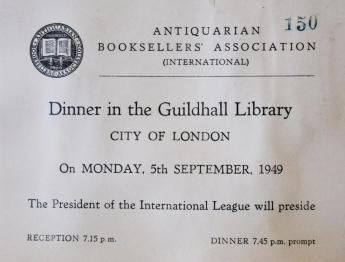
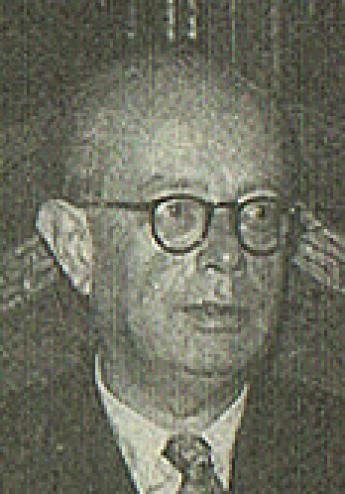
Response by the Deputy Lord Mayor (The RT. HON. LORD BROADBRIDGE, K.C.V.O.) to the President's Toast:
Ladies and Gentlemen, I must first of all thank you, Mr. President, for the very pleasant way in which you have proposed this toast and you, ladies and gentlemen, for your cordial reception.
Speaking for the Lord Mayor, ladies and gentlemen, I can say at once how your Society is welcomed not only to London but to this ancient Guildhall. Of such antiquity itself, with so many priceless treasures in its library, it is right and fitting that those who love old books should be entertained within its walls. But in spite of the fact that there are so many Antiquarian Booksellers here, on glancing round the room I have seen no evidence of anything antique in any of you. On the contrary, everyone I see here seems to be full of vim and energy. But "antiquarian," of course, suggests something of the past. In these days of modern ideas, in literature as well as other things, it is good to look back to the past and to realise the value of craftsmanship that produced such works, which to-day cannot be repeated, and if lost or destroyed are irreplaceable. Books, particularly those great thoughts of poets and writers throughout the ages and throughout the world, are a store place of culture. I have no doubt that most of us discover that there are many gaps in our knowledge of life and people. These books help to fill those gaps and the more we use them, the more valuable they become. I think these qualities are most pronounced in the literature of the past than in the present. To-day, sensation and scandal are much too prevalent. In book characters we can often see ourselves, or what we should like to be, for we are indeed living books.
The present age is supposed to be one of progress. Some say it is so. Others say that it is a revolutionary era. Whichever is correct, it is pleasant and it is restful to read and get back to the period of our ancestors when life was gracious and leisurely and one could enjoy beauty.
I think that this is the first time I have, either as Lord Mayor, myself, or as locum tenens for the present Lord Mayor, attended a function connected with old books, but a Lord Mayor must be prepared to do anything, and it is a wonderfully refreshing experience to range from a Royal function to, perhaps, a school prize-giving; from the bestowal of the Freedom of the City upon some distinguished personage, to a meeting of one of the committees responsible for the smooth running of this mighty City, and numerous other functions.
Whatever it is, however, it is made easy by the great interest and indeed love felt by those who hold the office of Lord Mayor of London for their fellow citizens and their country, and by the esteem and affection with which London is regarded.
Mr. President, it has been very pleasant meeting you all to-night. I hope that your Conference will be successful and a source of inspiration to you, and that your visit to our Capital City will remain one of the happy memories of your life.
Toast: "THE INTERNATIONAL LEAGUE"
Proposed by MR. JOHN CARTER, Antiquarian Booksellers'Association:
Mr. Chairman, My Lord Mayor, Ladies and Gentlemen,
I greatly regret that I cannot say, in the words of my illustrious compatriot, "Look out, I am going to speak French." But is has been decreed that to-night I should speak English.
I am as much at a loss as I dare say some of you are to understand why, from among so many of my elders and betters, I should have been selected for the honour of proposing to such a distinguished company the toast of the International League of Antiquarian Booksellers. But although I am on my feet this evening under - as I consider - entirely false pretences, there are, of course, several things which any member of the A.B.A. would be glad to have the chance of saying on this auspicious occasion.
First, we of the British Association should wish to thank you, my Lord Mayor, for adorning our gathering not only with the splendour of these time-honoured surroundings, but also with your own worshipful company. We should wish, further, to pay our own Association's special respects to the League's first President, our chairman, M. Kundig; and to thank both these gentlemen for the apt, eloquent and witty speeches with which they have graced the proceedings.
Secondly, we should wish to offer a resounding salute to the International League itself; and to express once again our gratification that its first plenary session should be held in London. If the honour of its conception belongs to Holland, as represented by Mr. Hertzberger, no single man has done more to bring it to birth than our own immediate Past President, Mr. Percy Muir. Our delegates, led and inspired by him, helped to grapple with its first and knottiest problems. Our Association as a whole at its last annual general meeting, endorsed the League's draft constitution and supported its announced programme. This was done with a full sense of responsibility, and indeed (in keeping with that sense of responsibility) not without certain healthy reservations and some shrewd questioning on points of detail. But I trust I speak for all my fellow-members of the A.B.A. when I say how happy we are that the International League is now no longer a utopian dream, no longer even a promising blue-print, but an accomplished fact.
We owe a great debt - and here I venture to speak not only for the A.B.A. but for all of us here to-night, and also for those members who cannot be present - we owe a great debt to the vision and enthusiasm of the League's pioneers. We owe a hardly lesser debt to all those who have given so freely of their time and energy and experience to the task of translating the idea into reality. One does not need to have attended a meeting of the Foreign Ministers, or a session of the United Nations, to be aware that differences of viewpoint have been known to occur between the friendliest representatives of ancient, proud and independent peoples. I consider it reflects great credit on the delegates of all our countries that, during the preparatory conferences, the real will towards co-operation overrode all petty difficulties, and even some wider divergencies of opinion. It is clear that the spirit of sensible compromise, long considered a characteristic of the English, has now infected - and in this case how beneficially - our neighbours in Western Europe.
Yet it is not enough simply to be grateful to, and to applaud, those who have made the League. It is not even enough to approve of it, and vote it the necessary funds and put its device on our notepaper. It is no good imagining, however distinguished and devoted its officers, that the League will run itself. On the contrary, the League will be no stronger than its weakest link. Its credit, its usefulness and its efficiency for our common good, will from now on depend on the steady and responsible support of every individual member. And unless we are prepared to give it that support, the drinking of its health will be no more than an empty gesture.
The League is still a very young organisation. We must not expect it to run before it can walk. Still less have individual associations or individual members the right to think only of what they are going to get out of it. Dividends come from investments: and the League's dividends, which we shall all share, will be proportionate to the investment we ourselves put into it - an investment of money, certainly; an investment of skill, experience and hard work still more; but most important of all for us of the rank and file, an investment of confidence.
And now, in the firm belief that this investment of confidence will not be lacking, I give you the toast, ladies and gentlemen, of The International League of Antiquarian Booksellers.
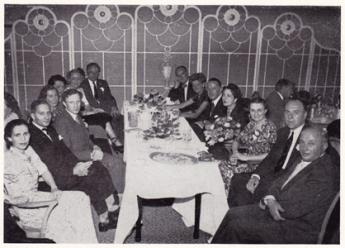
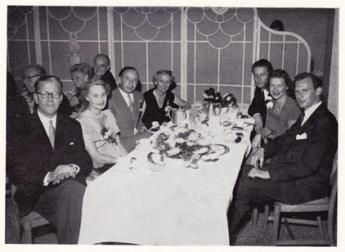
Response by MR. MENNO HERTZBERGER, President of the Dutch Association:
Prenez garde! I now must say in my turn, I am going to talk English.
The President of the A.B.A., Mr. C. D. Massey, has kindly asked me to answer the toast to the League, given by Mr. Carter, for the honour of which I thank him. Fortunately for all of you -and if I may say so, for me as well - such an expert on English literature as Mr. Massey did not think about Milton's Aeropagitica and has given me a time limit. When a man goes to a dinner he expects something good. Well, in our case we got something marvellous, being received in such a manner within this historic building. But besides this, we had the pleasure of listening to Mr. Carter's eminent and witty speech. Certainly there is a taste and a technique in making a speech, and I think that Mr. Carter has shown just as good a taste and just as fine a technique now as when he wrote his book about book-collecting. It was good to hear from him such praising words about the League, and I trust that everybody not present to-night and who does not share our views about the necessity and importance of the League of Antiquarian Booksellers, will be won immediately.
This morning our President, M. Kundig, said we were one family. I only hope for the sake of all of us that this will not be interpreted by someone according to Pope's opinion, who said that often a family is a commonwealth of malignants. Certainly we are one family, one international family based on sound, healthy nationalism. The officers of the League try to understand the requirements and characteristics of each country affiliated to the League and to do their work, accordingly, to the benefit of the whole Antiquarian Book Trade. "Books," as Conrad said, "are our first thoughts," and he adds, "our persistent leaning towards error." All of you who have been more than five minutes in the trade (unfortunately several nowadays are only three minutes in it) will agree with Conrad. Acknowledging, as I said before, the requirements and characteristics of each country, and also what my friend Andre Poursin said this morning, that we are des hommes libres, des hommes independants, it is the aim of our League to reduce this persistent leaning towards error to a minimum. Our aim, which can only be fulfilled when all of you give us officers your whole-hearted support, is to stimulate our knowledge of books, by intensifying our friendship among colleagues, and by furthering our business activities and connections.
Toast: "THE GUESTS"
Proposed by MR. P. H. MUIR, Past President A.B.A. and Vice-President of the League:
Mr. President, My Lord Mayor, Ladies and Gentlemen,
I have the pleasantest task of the whole evening, which is to propose the health and happiness of our guests. And it is a particularly pleasant task because as I look around I find that you are all a very healthy and happy-looking lot.
But before I proceed to my main task I would like to say with what mingled feelings of awe and self-importance the humble bookseller finds himself with the opportunity to speak within these hallowed walls. This building in which we have dined this evening is in a very real sense the centre of the City of London - not the great sprawling town which our guides this afternoon told you extends 15 miles in every direction from Charing Cross, but that central core, that heart of the great town which is the City of London.
If the City of London is the heart of the town, it is from this building that the blood is sent coursing through that great body. In another part of this building there is an annual event which takes place on Lord Mayor's Day, November 9th, every year, when the Prime Minister of this country for the time being comes here to dine in honour of the Lord Mayor and, if you will permit me a colloquialism, to let the cat out of the bag. He comes here to give his estimate of the state of the country for the time being and his forecast of what is likely to happen to the country during the next twelve months. During my lifetime those estimates and those forecasts have not been uniformly pleasant, and whoever may occupy the Prime Minister's chair on November 9th next will also not have a very enviable task.
But I just wanted to say that, glancing towards this top table this evening you may occasionally see a beatific expression and a rapt smile on our faces. If that puzzles you, you must remember that we are basking a little in the reflected glory which descends from others upon us.
So much by way of preamble, and before I come to my main task I am instructed - and it is my great honour to do so - to convey to you greetings from two gentlemen who would have liked to have been guests here this evening, but who were prevented not by more important but by previously-contracted engagements from being present. Their Royal Highnesses the Duke of Edinburgh and the Duke of Gloucester were, as I say, prevented not by more important but by earlier engagements from being present. But they send to each and everyone of you their warmest personal greetings and their hopes for the success of this Conference and the future of the League (applause). Coming from those high quarters-quarters for which we have, all of us, not only a very real respect but also affection - it is a considerable pleasure to me to have the opportunity of passing on those messages to you.
Now I come to my toast, and I am going to ask the privilege of being allowed to extend that toast a little and give you a toast which can be drunk not only by the hosts but also by the guests. I shall give you a double toast, and presently I shall tell you what it is. I spoke just now of the fact that in another part of this building it has been occasionally necessary to issue statements which are not pleasant. But we are not interested in gloom or despondency and I am going to ask your indulgence for a few moments while I illustrate the fact. If we take as this illustration the five-pound note, or its French, Italian and other Continental equivalent, we may say to-day that its value is perhaps thirty shillings. That is to say, that what we could buy with a five-pound note in 1913 - cigarettes, fountain pens, ladies' hats - no, I had better withdraw that because it was not possible to buy ladies' hats- would cost you more than five pounds to-day. I said that that also applied to the Continental equivalents, but of course there is in Europe one exception, and that is the Swiss currency. And I would ask you to note that even at that early age our President displayed the far-sightedness to choose to be born a Swiss. But even in Swiss francs we can buy less for an equivalent sum to-day than we could buy in 1913, and here again I would ask you to note that our President chose not only to be born a Swiss but also to become a bookseller, and if you know of a more delightful combination than a Swiss bookseller I should like to know what it is. There are few books which you could buy in 1913 for £5 which would not cost you a great deal more than £5 to-day, and that is why I say that the things we have the privilege of handling are things of real permanent value. That brings me to the fact that all of us here to-night are bound together by a common link, and you all know what it is, or at least you think you know what it is. I suppose you would call it the love of books. I would, however, respectfully suggest that this is merely a façon de parler. It is an outward symbol of something far deeper and, with all possible respect, I suggest that the deeper thing of which it is a manifestation is a form of eccentricity. It is eccentric to be interested in books. And let me go further. If your interest extends to old books it is something more than eccentricity - it is a form of lunacy. As I look round at this gay and distinguished assembly this evening I find that I can make only one exception to that general rule and that is for my Lord Mayor (laughter).
Now, if any of you feel I have gone beyond the limit in what I say, let me put it this way. Which of you does not treasure a whole sheaf of stories about the crazy behaviour of his customers? And let me remind you that if by a strange turn of heredity this state of mind ceased to be produced, you might as well shut up shop. Be sure that these customers, too, treasure equally singular stories about you.
If I may again be permitted to intrude a small matter of business on this festive assembly, our President this morning reminded us that we have some anxiety about our budget. Might I suggest to the League that if they were to appoint an editor to gather together the cream of these stories and publish them, the royalties from this publication would relieve the League of any anxiety for many years to come.
And so, Mr. President, My Lord Mayor, Ladies and Gentlemen, may I ask you all to drink a double toast; first and foremost that the members of the A.B.A. drink the toast of "Our Guests," but hosts and guests alike to drink a toast to the "bibliomaniac," and may his mania never grow less.
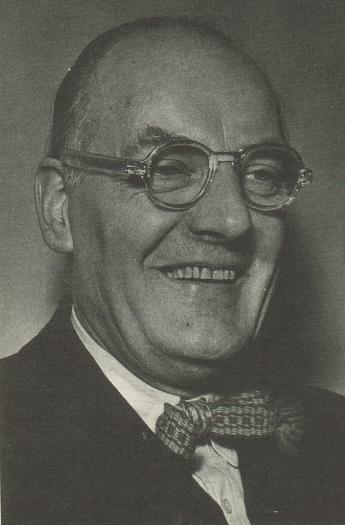
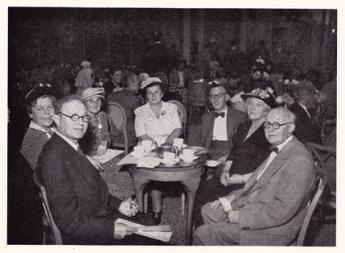
Response by M. FL. TULKENS:
My Lord Mayor,
I should have been delighted to be able to express in English on behalf of all the foreign delegates our feelings at being guests in this illustrious and venerable hall. Such, however, is my respect for your language that I shall ask you to allow me to speak French. The following is a free translation of M. TULKENs's speech:
My Lord Mayor,
In the name of my colleagues who have come from so many countries, it is my agreeable task to be their interpreter, and to express to you all that we feel in being your guests to-night in this celebrated Guildhall. There are few cities in history where the idea of liberty has been more stubbornly defended by those men chosen to be the leaders. It was in the service of this proud and noble ideal that all the efforts of your illustrious predecessors, such as Fitzalwin, Whittington, Beckford, and many more, were directed and which give to the history of the greatest city in the world such universal appeal. Evoking this ideal of liberty, of which Kipling said "Who stands if freedom falls?" how could we not cast our minds back to those dark days when our anxious yet hopeful eyes were turned towards you, heroic people of Britain.
Our faith has returned so often to warm itself at this torch of Liberty which you determined to save at all costs for the world. How we followed those bombardments with anguished hearts, thinking of the great loss of life and the destruction of beautiful buildings. Once again you have shown to the world that one is never conquered as long as one has the will to conquer. Already in the twelfth century, almost with prophetic sense of the glorious and terrible hours through which your city was to live, William Fitzstephen said, "Of all the noble cities in the world of glorious renown, the City of London is the one which holds its head highest." It gives me deep pleasure to assure you, my Lord Mayor, of the profound admiration we had for you all during those years when the destiny of your country was bound up with that of our own.
My dear President, and dear English friends,
My good friend Mr. Muir has spoken so kindly in receiving us that I would like to assure him of this: all the good opinion he has of us we also have of you, and it is a very great pleasure for us to be here.
You are receiving us with such lavish generosity (which we know is an English tradition) that in looking through the programme of the Conference some people might wonder, "But when do they work?" For indeed during this week, so happily begun with a tour of London, which enabled us to see once more your interesting city, you will take us to Windsor, and to the lovely town of Cambridge, that "Poets' University," as it has been called; for since Marlowe right up to our own day it is astonishing how many poets she has sheltered. Wonderful indeed is Europe (we can never repeat it often enough) which can offer to the gaze of its pilgrims these depositories of thought and art.
When on our return last year from Copenhagen we were asked about this new League which we had formed, I thought of Sir Waiter Mildmay's reply to Queen Elizabeth when she asked him if it were true that he was founding a new college. "Your Majesty," he replied, "I have planted an acorn, which, when it becomes an oak will bring forth God only knows what fruit." Though our League has not yet achieved the stature or splendour of an oak, we can all the same congratulate ourselves on what we planned in Copenhagen, for under the energetic yet pliant direction of our dear President, helped, as we all know, by a most industrious Committee, it already has some useful results to its credit. In this atmosphere of confidence and mutual esteem failure is impossible.
Will you permit me, My Lord Mayor, to ask all those present to raise their glasses to the prosperity and happiness of the noble city of London, and to the ever-resounding fame of English books.
FAREWELL DINNER AT THE MAYFAIR HOTEL
Saturday, 10th September, 1949
MR. DUDLEY MASSEY, President of the A.B.A.:
My Friends,
This is a memorable occasion as we are bringing the Third International Conference to a close after what has been a successful and happy week.
Though it is with regret that we say goodbye for the present to our many friends, we all look forward to next year's Conference in Paris, where many of us hope to meet again.
I think that the Third Conference has been as successful as the first two and to all of us has been brought home the importance of the League. We have solved several problems and the work which the League is doing has been explained and appreciated. I feel that we have been wise in making no radical change in the statutes of the League; it is most important to give it a chance to walk before it runs.
At this point I must refer to our President. M. Kundig has proved an admirable President; his enthusiasm and the amount of work he does on its behalf have been brought home to us this week. More than that, he has won his way to our hearts by his tremendous sense of humour. In his many admirable speeches he has not only said the right things at the right time, but has made the right jokes also. (The sudden appearance of M. Popoff, the Russian delegate, at Beeleigh Abbey will long be remembered.) While the League is under his direction we can rest assured that it will be energetically controlled and will become firmly established.
It is not for me to speak of the social events we arranged for your entertainment, but several times, especially in the elaborate beauty of King's College Chapel, or yesterday as our coaches drove slowly past that part of the Thames where more than 700 years ago we first insisted on our rights as a people, I have felt proud that we have been able to show you these things.
I must now thank all those of our members who have helped to make the Conference a success. There is the Ladies' Committee over which Miss Myers has presided; they deserve the thanks of all our members. Then there are the stewards who have worked so energetically under the able direction of Mr. Philip Robinson. I must especially mention Mr. Franco - the indefatigable Franco. What would we have done without him? Nor must we forget Mr. Davis, the interpreter at the Conference, nor the work done behind the scenes by Mr. W. H. Clark, our secretary, and his assistant, Mrs. Herbert. As for the sub-committees who organised everything in the first place and who have worked unceasingly, I am sure that they wish to remain anonymous to-night and feel amply rewarded by the success of the Conference.
We welcome you all here to-night and we are glad that we have not only many Presidents of foreign Associations with us here, but that there are no less than seven of our own past Presidents: Mr. Percy Dobell, one of our oldest members; Mr. Ferguson, a bibliographer and President of the Bibliographical Society; Miss Banks, our first lady President; Mr. Lionel Robinson, one of our best and most popular Presidents, of whom we shall hear more later; Mr. Cohen, with whom I often cross swords in Committee, (but I think none the less of him for that); Mr. Harris, what can I say about Mr. Harris, who is so well-known to us all? and finally Mr. Muir, whose name is by now synonymous with that of the International League and whose work on its behalf is second only to that of our President himself.
I have now almost finished - there are other speakers far more competent than I am to honour this occasion. Standing here to-day I feel rather as I did eleven years ago to this very day. On that occasion, however, the words I nervously uttered were of one syllable, in fact, "I will." You will see then that this day has a double significance for my wife and myself, and I am proud that she is able to be present here on our wedding anniversary. And now, my friends, let us look forward to next year's Conference. It is a great joy to us all to know that it is to be held by our French confreres in Paris.
I shall now ask my wife to say a few words in French as I am not able to do so.
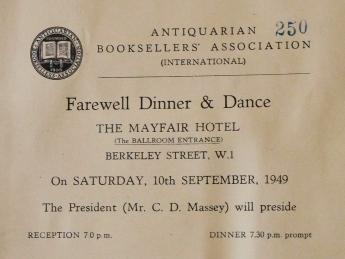
MRS. MASSEY (translation): Ladies and Gentlemen,
I simply wish to say to you that this has been an unforgettable week for me. I feel that we have become real friends, and that we have thereby increased a little that international friendship and confidence which we desire with all our hearts.
When I accompanied you to Cambridge and Windsor I felt a deep pride in showing you some of the beauties of our country, but after all, these things are the fruits of the human spirit and are thus your heritage as much as ours.
And now, my friends, I wish you all good luck and I say to you, "A bientôt."
M. W. S. KUNDIG, President L.I.L.A.:
Mr. President of the A.B.A., Ladies and Gentlemen,
Before embarking upon the agreeable task of thanking the A.B.A. in the person of its President for the admirable reception of which we have been the beneficiaries in London and for the no less admirable organisation which the A.B.A. has devoted to all these things, I propose to submit to the International League a new and final project which I beg them to examine with the great attention that it deserves.
You all know, Ladies and Gentlemen, how agreeable the life of a bookseller is; he is among his books, he prepares his catalogues, he meets colleagues and erudite clients. Now this kind of life is so agreeable, so full of attractions, that a bookseller on holiday, far from his books, far from his colleagues, far from his customers, is as miserable as a mariner shipwrecked on a desert island. What can be done to remedy this? All that is needed is simply to organise communal holidays for booksellers. We have made, this last summer, the first beginnings; our friends the Tulkens and ourselves, instead of burying ourselves in isolation in some remote hole, we took our holidays together at St. Moritz. It was charming. Percy Muir joined us, calm as usual. We shut ourselves up, all of us, in the bar for one entire afternoon, and what do you think we did ? We talked about books and we thoroughly enjoyed ourselves. At 6 p.m., the Muirs went back to Coire having seen nothing of St. Moritz but the bar of the hotel. But I submit to you, ladies and gentlemen, that surely this was more reasonable than to scramble some 10,000 feet up a mountain and risk our bones.
That is why, having had this experience, an experience that has been conclusive, I now make the firm proposal to organise for next year communal holidays in which all booksellers participating will assemble in chars-a-banc which will be followed by two other chars-a-banc, one containing a library and all the bibliographical material necessary for making catalogue descriptions, the other with a bar, well stocked with cold drinks. In this style we will traverse all the cities in Europe, halting only in those where books are to be found. Every evening there will be a discussion about the day's business, and eventually an auction sale of the purchases of the journey. We might, in order that the caravan should be less inconspicuous, have it preceded by the flag of the League with its device, and a herald sounding a blast on his trumpet. What do you say to the idea which I have just submitted to you?
While I await your answer, I thank the A.B.A. once more for all that they have done for us. I thank everyone for all the continual support that they have brought to our discussions, and, as I have the advantage of being a bilingual President, I reap the unusual benefit of speaking in two languages, therefore of drinking twice.
I raise my glass to the A.B.A.: Vivat, crescat. floreat in aeternum.
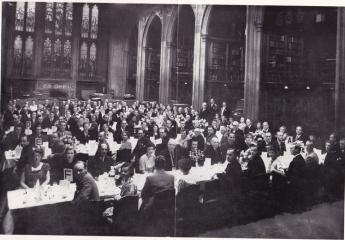
Response by MR. LIONEL ROBINSON, M.C., A.B.A.:
Mr. Chairman, Ladies and Gentlemen, It is a very great honour to respond to this toast, and to thank you, Mr. President, for the very charming and generous way in which you have expressed your thanks to the Antiquarian Booksellers' Association. We are happy to have been told, and to feel, that things have gone well. We hoped that it would be so, and I assure you most sincerely that we have been proud to have been your hosts on this great occasion.
I respond on behalf of all the booksellers of the A.B.A., and I think I ought to tell you something about them. They include gentlemen whose names need no introduction and whose firms are famous throughout the world. Mr. President, you have named Mr. Massey, and you are right to do so in view of his great unselfishness and devotion to his job. Then there is Mr. Percy Muir, who has been an inspiration to everyone of us. These two gentlemen in particular have worked like the very devil.
But for every member of the Association present there are four who are not here. These absent booksellers form the firm and solid background of our Association. They are on the whole typical British people, slow to start things, but very hard to stop, inclined to be safe rather than sorry, and not at all anxious to sell their books abroad without being sure they are going to be paid for them (laughter). The confidence which the International League will give them will, we feel, be a good thing and help them to do more business. We feel sure that it will.
As a result of this week's work I am quite sure that we can go ahead and tell booksellers in every country that without any doubt the International League is a fine and good thing - that it means business, and has come to stay. I can assure the foreign representatives that the British Association will take their full share in the future work of the League.
The League to-day is very fortunate in having such an excellent Committee and so amazing and outstanding a personality as Mr. W. S. Kundig for its President. I have often wondered where he gets his tremendous vitality. His handling and control of the meetings, his ability as a linguist, and his sense of humour can only be described as superb. We feel that our work is pioneer work, and although the way ahead is full of difficulties in every country, yet we must try to sweep restrictions away and hope that the world's business will be conducted rather by business men than by economists. A very apt definition of an economist, I think, is one who thinks he knows more about money than those who have it (laughter).
I was glad to hear from Mr. Kundig about the social side of the Conference. We have seen happy faces everywhere and rejoiced in them and felt things were going well. You have seen something of the great city of London, something of the country, something of our libraries, some of our bookshops and I hope you have done good business there, and something of the British way of life.
Well, Mr. President, we feel it has been a wonderful week. Goodwill and friendliness have been the keynotes and we are happy to see so many people to-night-lovely ladies, lovely dresses, and lovely dispositions. But my colleague Mr. Joseph will have something to say about this, and as I look around I think he has a very pleasant task. And so, on behalf of every member I thank you most sincerely for your generous toast. You are a true ambassador of goodwill, and we thank you.
Toast to the Ladies by MR. JACK JOSEPH, A.B.A.:
Mr. President, Mesdames and Messieurs,
I propose the toast "Au Revoir, Mesdames." This is the saddest toast of this occasion - to say goodbye to the charming ladies present. You have graced these proceedings in a manner which I cannot adequately describe and I am sure the enjoyment of this last festive week would not have been so great without your charming presence in our midst. I do not like saying goodbye to ladies in this fashion - in such a public manner. The manner of thirty odd years ago was much more to my liking. The lights were not full on and there was much more privacy. Of course, that was ten, twenty, thirty years ago. "Plus ça change, plus c'est la même chose."
We have come to the end of this very, very interesting occasion. I hope, on behalf of the A.B.A., that you have enjoyed being with us, and I must echo the words of my colleague, Mr. Robinson, that you somehow do appreciate the British way of life and of course some of the difficulties which we are still undergoing. But in spite of it, I feel somehow convinced that if the A.B.A. invites you all to come again you will come - and if they don't invite you - well, I will.
And with these few words I wish you all Godspeed to your native soil, ladies, and hope that you will retain this last week as a happy and everlasting recollection.
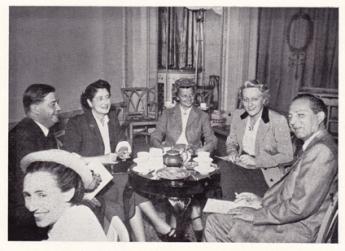
Response by MME. KUNDIG:
Before thanking the A.B.A. for having so kindly invited the wives of the booksellers to accompany their husbands, I am going to tell you, according to my personal experience, what it means to be the wife of a bookseller. I do not know whether all booksellers are like my husband - I have only one experience of this kind - but it has lasted thirty-two years, and the most extraordinary thing about it is that I am still alive. It is not a man that I have married, but an earthquake. Always at the latest possible moment he suddenly tells me that we are off to Paris, London or New York for a sale or simply to visit some colleagues. One day I thought I was making a pleasure trip to Copenhagen, but by the time I got back I was the wife of "Mr. President of the League," and it is thus that I have been drawn into an adventure which causes me to occupy a place of honour which I have certainly not deserved, a place of which I feel myself quite unworthy and one in which my discomfort was brought to a peak when I found myself seated on the right of the Lord Mayor of the City of London.
Always and everywhere, if I like it or not, I must accompany my husband; first because he wants me to, secondly because I know that I am indispensable to him (at least for packing the suitcases). Also, if I leave him for one moment he is sure to make some ill-considered purchase. Thus, only yesterday he left me to go and see some rare books, and returned wearing a fantastic hat which he had found at Scotts, a hat at the sight of which I nearly collapsed.
Happily, the medal, of which I have shown you only the reverse, has another side to it. On this other side are the enchanting times spent in the company of the booksellers' wives, who are my friends, and of their erudite husbands.
It will be said many times this evening that we have been wonderfully received by the A.B.A., but it cannot be said too often and, what more can I say, in answer to the amiable words of Mr. Joseph, but to repeat to the British Booksellers and their charming ladies: "Thank you."
MR. IFAN KYRLE FLETCHER, A.B.A., Master of Ceremonies:
Ladies and Gentlemen,
Welcome to the end of a memorable week, and this is the last time I shall call you ladies and gentlemen. In the future I shall call you friends. The time for formality is over. We have only a few hours left to enjoy each other's company, and let us enjoy it to the full. It is a few hours in which we must balance as best we can the pleasure which we have had during this week with the sadness which we experience at parting from so many people, some of whom we see again after many years, some seen for the first time, but all of whom have been very welcome to us in England. It will now be the very great pleasure of the English booksellers, their friends, and their ladies, to hear a few words from the leader of each of the delegations who have come to this Conference. I hope that the English booksellers and all English people present will give the most hearty welcome to each speaker as he or she rises to represent his or her country, and I hope also that if the spirit should move some of the delegations to express any feelings which they have in ways other than normal speech, for instance, if they might wish to break into song, let them have the feeling that we would like them to do so.
First we will have the Belgian delegation. Let me explain that we cannot make any order of precedence amongst so many good friends so we must resort to the method of our earliest efforts, the ABC; the ABC of countries.
First then, Belgium, and in thinking to-night of the person who will speak for Belgium, I am reminded of something which has been written in an English book about booksellers. The booksellers are not merchants who sell their goods in shops, but are courteous gentlemen who live amongst books and occasionally allow their friends to take one away. I am always reminded of this when I climb the rue du Chene in Brussels and open the door of No. 21. Ladies and gentlemen, we have mounted the rue du Chene in Brussels and opened the door.
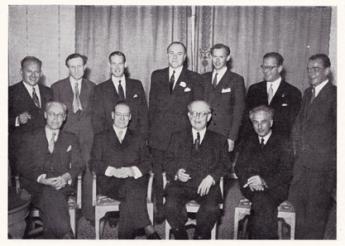
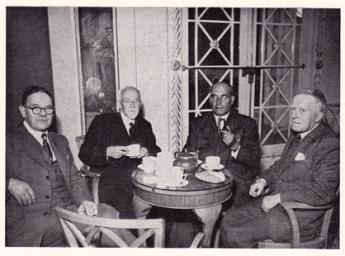
M. FL. TULKENs, President of the Belgian Association:
Mr. President, my dear English friends,
The Belgian delegation has asked me, and for me this is a great pleasure and honour, to tell you of the happy memories which, thanks to all of you, we take with us from this Conference.
My dear English friends, since Monday morning - I would even say since Sunday evening -you have constantly surrounded us with kindness and affability and we have felt so much sincerity in your friendliness that we are deeply touched and grateful.
For we Belgians, whose friendship with your country goes back so far, it is always pleasant to be again in England, where we find so many common memories. For if our first King Leopold, this "adviser of Europe" as he was called whose first marriage attached him so affectionately to your great country, came from you to us we can flatter ourselves that much earlier it was at Bruges that Caxton learned his wonderful trade of printing with Colard Mansion and in that town published the first book in the English language.
On our return to Belgium when we talk over this Conference with our follow booksellers, it will be easy, and to me a great source of satisfaction, to be able to tell of the positive and practical results achieved.
Our dear President Kundig has been an able leader and a formidable debater at our meetings. You have been called, my dear friend, a "dictator," which must have troubled your Swiss heart. But you must admit that it was due to your energetic leadership of the debates - in which, however, everyone spoke his mind freely - that we were able to complete our business by Thursday morning.
But when we are telling our friends about what you English call the good old times, and what we should call the sentimental past, I can hear them asking now, but where is this British austerity we are always hearing about? Because, my dear friends, I can assure you that we have seen very little of it since Sunday; your streets look charming by day, dazzling by night; Piccadilly Circus makes one think of Broadway; your shop windows attract passers-by, and I won't mention your bookshops, gentlemen, for the only restriction there is the depth of our pockets.
And now allow me to mention a personal experience: it was in December, 1944, the fortunes of war had changed and the Ardennes offensive had plunged us into the horrors and errors of war. One afternoon, which I shall not forget, one of your most famous Generals came into my shop, accompanied by two other officers. As I came forward to greet this distinguished visitor he said to me in the most pleasant manner possible, "Your friend Joseph sends you his best wishes and told me I should find some books on birds." I took advantage, while showing him some, of asking him, with that diplomacy and deference befitting a soldier of the second-class in speaking to a General, what he thought of the situation. Reluctantly taking his attention from one of Levaillant's plates, he looked at me with surprise and answered, "Well, that's all right, this is the last round." To see, at a moment which to me appeared critical, Field-Marshal Sir Alan Brooke (now Lord Alanbrooke) giving all his attention to a book on birds when the needs of the moment would have indicated a military map, remains for me unforgettable.
If I ever hear that Maurois is re-editing his Colonel Bramble, I shall tell him this story.
My dear English friends, you too at the present time give this same impression of confidence and certainty. In the hard post-war struggle I think you have also reached the "last round"; may we soon return to those good pre-war days for our happiness and our business prosperity.
In the name of the Belgian delegation may I thank you once again for your kindness, and I ask my compatriots to lift their glasses to those ties of friendship which unite our two nations and to the ever greater prosperity of the A.B.A.
MR. FLETCHER:
You may remember that there is a book in English which says something of the nicknames of famous booksellers, and how after naming "Dead Pa" and "Mad Mario" it says, "But Mr. Dobell is Mr. Dobell," and how happy we are to see Mr. Dobell with us to-night. My friends, what a subject for the League's historian - nicknames of booksellers. One of the League should surely take up this subject and write a book about it. And one of the first to find a place in that book I am sure, would be the President of the Danish Delegation, because nicknames are always a sign of affection, and there would be no one for whom we feel more affection than for Mr. Gronholt Pedersen, of Copenhagen, Denmark.
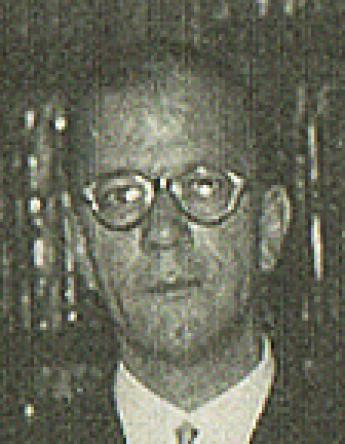
MR. GRONHOLT PEDERSEN, President of the Danish Association:
Mr. President of the A.B.A., Ladies and Gentlemen,
A year ago many of us met at the restaurant Nimb in Tivoli, in Copenhagen. All were jubilant, quite naturally, because a child had been born. It had been a long time coming. Already the labours had begun in Holland in September, 1947, and one year later the marvellous thing happened in one of the better maternity wards, the Hotel d'Angleterre in Copenhagen, where a nice, full-born child with not less than ten fathers greeted the world on a fine sunny day, and was given the beautiful name LILA (Ligue Internationale Librairie Ancienne).
When the "Big Ben" of Copenhagen chimed the midnight hour, fireworks were let off in honour of L.I.L.A., and the glad tidings were given to the whole world that the antiquarian booksellers would take this new-born child as their own, tend and nurse it, give it good and wholesome food and, not least, a rational and proper education, so that throughout life it could be a symbol of true fellowship and international understanding.
Now L.I.L.A is one year old. We rejoice that L.I.L.A. is growing and thriving and showing progress. L.I.L.A. will soon be toddling and she is already making herself heard. We especially rejoice when L.I.L.A., through her charm, brings a new friend into the circle.
Congratulations on the day, L.I.L.A. Your friends in Denmark send wishes that the New Year may be full and happy. And we thank our famous adopted father, Mr. William S. Kundig, for his great love and his exceptional offering. But another thing, ladies and gentlemen, the Antiquarian Booksellers' Association (A.B.A.), has invited us to this glorious birthday, and numerous guests from many countries are present.
An unforgettable week has passed - too hastily - and this evening brings us to the end of the happy days with our good colleagues, now also our good friends, which is one of the most important results obtained at this Conference. From experience I know the great work that has to be done before such a great festivity, but I know also the joy when everything succeeds, and I think I can say that the A.B.A. takes the credit for the extensive and successful arrangements of this week.
On behalf of Denmark, I thank A.B.A. for the many delightful experiences and memories they have given us. The stay here is engraved for ever in our minds, and we are going home happy to have visited London and parts of "Old England" once more. We are feeling a pride in the ties attaching our royal families and our peoples. Our friendship started 1,500 years ago and it was confirmed six weeks ago when a great part of the English nation cheered the fifty-two Vikings who arrived with the ship "Hugin" and went ashore at Broadstairs.
May I finish with the words of one of Denmark's most celebrated scientists. He said, "Among the booksellers the antiquarian booksellers are the aristocracy proper. Everywhere in the world the standing of the trade with antiquarian books shows the literary culture of the place."
The stay, and the fellowship of these days, has given us a clear confirmation of the high standard of the English antiquarian booksellers, so giving splendour to our common work and bringing honour to our International League.
With these words, and the wish that A.B.A. and its members may continue to have good luck, I beg you, ladies and gentlemen, to join me in the toast to the Antiquarian Booksellers' Association - A.B.A.
MR. FLETCHER:
It is very flattering to us English to find a foreigner who loves our literature as well as we do ourselves. Many years ago when I first met Mr. Erich Olsoni, I found a man who paid us this charming compliment. It has been one of the pleasures of this Conference to see him again. To-night he will say a few words for the Finnish delegation.
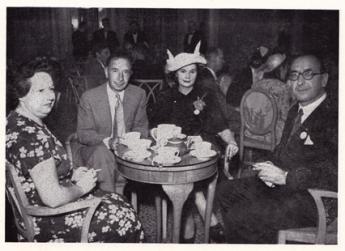
MR. ERICH OLSONI, President of the Finish Association:
I should have liked to make a speech as delegate for my country, a little nation, but still going strong, to thank you for all your kindness. But my knowledge of English is not so good, as you know, and therefore I hope you will allow my daughter, Mrs. Nilson, who in Finland is my left hand, but in England my right, to say a few words in my stead. Personally, I only wish to thank you ever so much for all the beautiful impressions.
Mr. President, Ladies and Gentlemen,
It gives me the greatest pleasure to take this opportunity of expressing to you our gratitude for a charming week which is now all too soon drawing to an end. To ourselves it has been all the more memorable because it was the first time that direct contact in our field was established between our two countries.
What we have seen, not only in the way of rare, famous and beautiful books, but also of the old civilisation which created them, has been almost too much for us antiquarians. After these days in England, we can only say that the reality has exceeded all our expectations. We have gloated over things, the mention of which used to make us hold our breath. We would probably "put out feet into it," were we to single out any particular event in the beautiful series of experiences in this country. If I may use a picture, which is particularly dear to me personally, I would say that we have been in Alice's Wonderland. It will take time to digest all that we have been sipping in, but it is embedded in our systems - a treasure of impressions on which we shall be able to draw during coming years.
It remains to exploit our inadequate means of expression to thank our hosts for the exquisite days they have given us and for all the memories which we are taking back with us to Finland - and, at the same time to wish the A.B.A. every success in its future activities.
MR. FLETCHER:
In France, we hail the great bookselling country of Europe. It is right that it should be a great bookselling country because it is one of the ancient centres of European culture. It is good to remember that France's national association has more members than any other.
Much has been written in England and many other countries about the attractions of the bookstalls on the quays of Paris, although stories of the number of bargains to be found there does less than justice to the shrewdness of their owners. Much less, however, has been written of the great Paris bookshops, shops which are so dear to us in London that some of us know them almost as well as the shops of our own country. But this is an omission we will all be able to repair in person in 1950. We hail the French delegation and M. de Nobele, its President.
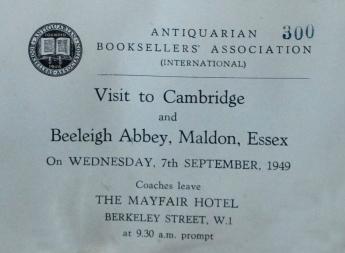
M. F . DE NOBELE, President of the French Association:
Ladies and Gentlemen and dear Colleagues,
In spite of the delightful way in which Mr. Massey has filled up our time, I found a minute to browse at a stall in the market place of Cambridge, and I was lucky enough to buy for two shillings a little book called "English in Thirty Lessons," thanks to which I can speak to you in what I call your language, if it is not an offence for me to do so. One of the happiest results of the League is the friendship which unites all of us who, from Amsterdam onwards, have seen its birth. The least I can say is that this friendship is very dear to me.
The League has become so powerful that it has done what Hitler could not do. It has abolished the Channel. Booksellers of every country have invaded England. They have been seen in London, Cambridge, Windsor, at Maldon, in Bond Street, Piccadilly, Soho, Charing Cross … in a word, everywhere, even in the "pubs." … And a fifth column, which I shall refer to under the mysterious initials A.B.A., has received them with open arms, with flowers in one hand and a bottle in the other. In a word, as a result of this treasonable conspiracy, there are no more islands but a solid union of all booksellers of Europe, and I do not think it will be long before we abolish the Atlantic as well as the Channel.
Dear friends in Great Britain, in the little conversation manual which I bought, I have not found enough words to thank you, as we French would like to thank you. I assure you that we are delighted and amazed at our reception. Next year we hope we shall all be singing together "Sous les Toits de Paris." Meanwhile I want first to suggest that I should raise my glass and toast our President's wife, Miss Myers, and all the ladies present. Then, en français, I propose to drink the health of the A.B.A. and Mr. Massey.
Third proposal - I wish to drink the health of those who are responsible for it all, M. Hertzberger and Mr. Muir, without whose help the League would not exist, and if there had been no League there would have been no Congress. Another proposition is to drink the health of our President, M. Kundig, and the last proposal, in memory of our last Congress, is to drink and say that magic word we heard so often at Copenhagen, "Skol!"
MR. FLETCHER:
Holland is the country to which the League owes its very existence, the country within whose frontiers the first conference was held, at Amsterdam. As a result or that the League was founded, and therefore on that account I think there should be a very special welcome for Mr. Menno Hertzberger, of Amsterdam, who will speak for the Dutch delegation.
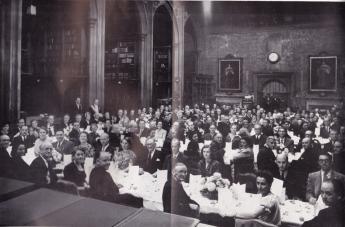
M . MENNO HERTZBERGER, President of the Dutch Association:
Ladies and Gentlemen,
Punch was asked "How do you peel an orange in public?" and his answer was "Take a banana." If I had taken his line of least resistance I would have been able to have my dinner in comfort, but I would not have been able to say a few words on behalf of the Dutch Association of Antiquarian Booksellers.
First of all I must thank you, Mr. President, and especially the stewardesses, headed by Mrs. Muir and Miss Myers, and the stewards, by Mr. Philip Robinson. What a marvellous reception we have had here! Everybody is impressed by the way you have entertained us this week. When one knows how difficult it is to organise such an affair and when one realises how well everything has gone, I think you will agree that we have to thank from the bottom of our hearts the stewards and stewardesses and Mr. Massey, who was the President of it all.
I have read somewhere that who is tired of London is tired of life. I am not tired of life, and that is why I am in London. But I can assure you that one can get very tired in London.
Mr. Robinson just referred to some 200 members who are not present here and who form a solid background to their Association. It may be that some of these 200 are not aware of the importance of the League. Mr. Robinson, I would advise you to take these booksellers to a pub, give them a glass of beer, and inevitably you will be able to talk them over to the League.
I have been asked to toast the health of the A.B.A. in Dutch. I want you, then, to drink to the health of your President, to the members of the Committee, and to the special committee of stewards and stewardesses. I will ask my colleagues to join with me in drinking the toast as well for the prosperity of the League of Antiquarian Booksellers.
The League was born in Holland, and had to be put in an incubator for a year. But now it can stand on its own legs and is even working properly, thanks to its committee and especially to its eminent President, M. W. S. Kundig. The toast then is the A.B.A. and the International League of Antiquarian Booksellers on behalf of the Dutch Association of Antiquarian Booksellers.
MR. FLETCHER:
This week most of the principal delegates have spoken at the Conference itself and at the social functions, and we have had several opportunities of hearing the voices of most of the principal delegates. Perhaps you are by this time rather tired of speeches. But one delegate we are very happy indeed to welcome because he represents a country which is another of the ancient cultural centres of Europe.
To-night we are to have the privilege of a first speech from Signor Bourlot, of Turin, who will speak for the Italian delegation.
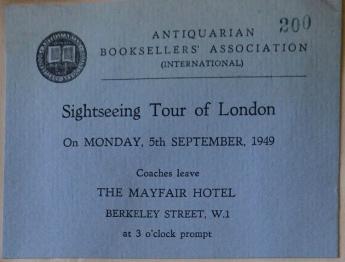
SIGNOR C. E. BOURLOT, Italy:
The President and Members of the A.B.A., Ladies and Gentlemen,
Though most unluckily I cannot express myself in the words of Shakespeare and Shelley, my colleagues have given me the pleasant task of expressing, on behalf of the Italian delegation, our sincere and deep gratitude for the cordial and friendly manner in which you received us in this beautiful town, the really superb capital of your great Empire.
This is the first international meeting which I have attended, and I cannot find words to tell you in an adequate manner what my colleagues and I feel in our hearts. In all sincerity I want to tell you that your kindness towards us has deeply impressed us.
We shall never forget the hearty and I may say affectionate hospitality that you, Mr. Chairman, and your colleagues in the A.B.A. extended to us, nor shall we forget the wonderful things that, thanks to you, we saw and admired in your beautiful country.
In such an atmosphere of reciprocal friendliness we have been able to work with profit and serenity for our still young League, which I am sure, will have a very prosperous life. And what is more, Mr. Chairman and colleagues in the A.B.A., with our deepest thanks will you please accept on behalf of the Italian delegation, best wishes for the prosperity of your great Association.
To Mrs. Massey and Miss Myers, and to the kind ladies of the committee who were so thoughtful and good to our ladies, I want also to express on behalf of our wives and lady visitors our most sincere gratitude.
M R . FLETCHER:
We have referred to the French Association of Antiquarian Booksellers as the largest in the world. Now it is our privilege to hear from the delegate of one of the smallest Associations, but one which has proved by its share in this week's work that it is imbued with the true spirit of internationalism.
It is a special pleasure for me to ask Mr. Nyergaard, of Oslo, to speak for Norway.
MR. C. NYERGAARD, Norway:
Mr. President, Ladies and Gentlemen,
On behalf of the Norwegian delegation I would like to say a few words on this occasion.
When we leave this country within a few days we all will certainly take with us a strong and vivid impression of having been treated in a most lavish way. The Antiquarian Booksellers' Association and its members have certainly done everything conceivable to entertain us. However, as you all know, we have not merely been entertained, we have partly at the same time seen some of England's finest memorials of the past; we have attended a wonderful concert, and last, but not least, we have been allowed to look behind the curtains of the unique collections of the British Museum
Furthermore, we all appreciated the visit to Beeleigh Abbey and its fine collections of books and art treasures. After having seen that house, I think that the slogan "Foyles for Books" should perhaps be altered to "Foyles for Houses".
Finally, I wish to express our deep gratitude to the Antiquarian Booksellers' Association for their arrangement of, and most excellent way of accomplishing, the Third Conference of the League, and for the unforgettable memories thus given us all.
I take the liberty to ask all overseas visitors to stand by and unite in a toast to the A.B.A.
MR. FLETCHER:
It is one of the unhappy results of increasing age and experience that some of the most attractive stories are discovered on investigation to contain not the slightest vestige of truth. I would like to tell you of one of these stories. It is a story I was told when I was a very young bookseller.
When the widow of Linnaeus sold his library to Sir James Edward Smith in 1784, the Swedish Government was so incensed that it sent the Swedish Navy after the boat which was bringing the collection to this country. I have recently discovered that although this story is widely circulated, there is no truth in it at all. But, having met the Swedish delegation, I am sure that if Linnaeus's library were being sold to-day the Swedish booksellers would certainly send the Swedish fleet after it.
I now call upon Mr. Ronnell, the Secretary of the Swedish delegation.
MR. G. RONNELL, Sweden:
Mr. President of the A.B.A., Ladies and Gentlemen,
On behalf of the Swedish Association I want to thank the Antiquarian Booksellers' Association most cordially for having undertaken the difficult job of organising this Conference and for everything it has done for the benefit of our League. I should also like to thank the Association for what it did for the benefit of the trade before the birth of L.LL.A. As regards the social side of the Conference, I would not dare to try to add any of my superlatives to all the praise accorded this evening. I admit quite frankly that we did not expect it would be possible for us to enjoy our stay in London so much as we have done. I must confess that we visitors hesitated a long time before deciding to attend the Conference, as we knew that we should become very indebted to you and in view of our poverty and insignificance should need about half a century of economy to repay you. We hope, however, that before that length of time we shall have the pleasure of seeing many members of our big international family in Sweden. I assure you that we in Sweden will always welcome you and do our utmost to look after you and entertain you when you do pay us a visit.
May I now propose a Swedish skole for our hosts.
MR. FLETCHER:
This new and beneficent movement of international co-operation owes a deep debt to Switzerland.
We have had the pleasure of being addressed by that great impresario of the book trade, the League's first and inimitable President, M. Kundig, and now we are to have the pleasure of hearing another member of the Swiss delegation and it is a special favour which is accorded to us because Dr. Thommen, who will speak to us in a moment, has very generously undertaken all the juridical and legal work for the League.
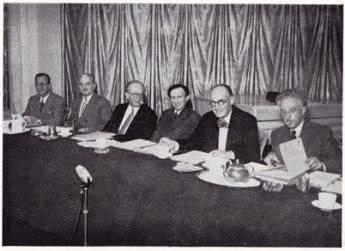
DR. THOMMEN, Switzerland:
In ancient times Greece was the land of superlative hospitality. Now in these modern times England may be considered the country where hospitality and friendship flourish in almost the classic way. We have been favoured by this wonderful hospitality. In every respect the programme arranged for us by the A.B.A. was not only the richest but also the most select I have ever experienced in my life and its technical organisation was just superb. We thank our English colleagues from the bottom of our hearts for their unforgettable kindness, and we shall take home unique memories of the way in which we have been so lavishly entertained. We only regret that we cannot return your hospitality, as we could not choose any of our cities as a suitable Conference centre.
We are very proud, however, of our English origin, and of the fact that Christianity and learning were brought to us by your countrymen.
Then there is another reason why we should be thankful to our hosts. We Swiss boast about being the oldest Republic in the world. We are always telling our many friends about William Tell and the apple and the last battle of 1515, which we lost. But after the French Revolution there was little true democracy in Switzerland. Much could have been learned about the government of our small Continental Republic from the Parliamentary Government of Great Britain. We have always admired the manner in which the English people submit to the restrictions laid on their shoulders when your country is experiencing difficult times. Such restrictions you gladly endure and the Englishman loses none of his freedom and remains always cheerful.
Now let us come to our main subject. In Switzerland to-day we have not enough clients to buy books; therefore we must find clients abroad. This means that we must build up our collections, and in England we find both our commercial and cultural objectives.
Our Conference has shown in a wonderful way that it is possible to sacrifice national to international interests. The League at present consists of eleven member nations. Others will follow. They must follow. Our ideal is that all nations should be represented. We must interpret the word international in the broadest sense. We must be guided by the great principles of humanism. It is quite clear, however, that nations who do not follow these principles should not be accepted. We cannot ally ourselves with those who do not allow the freedom of reading. We cannot exist in such an atmosphere. It is very sad to think that on this 200th anniversary of the birth of Goethe there are countries which are not permitted to enjoy his great works. Let us hope that the Paris Conference next year may be held in a better atmosphere.
MR. FLETCHER:
Ant that brings us to the end of the speeches of those who represent the international delegations, but we still have one speech which will be perhaps the most treasured of the evening, because it comes from the guest who has been very near our hearts during the whole of this Conference. I will call upon our American guest, Mr. Laurence Gomme.
Mr. Kundig, I might remark, has specially requested that he should give the toast in Red Indian.
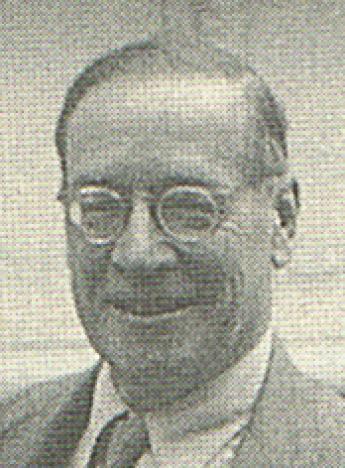
MR. LAURENCE GOMME, President of the American Association:
Mr. President, Ladies and Gentlemen,
President Kundig did not say whether he wanted me to propose the toast in Iroquois or the dialect of one of the other Indian tribes. Whichever it might be, however, I am afraid I am unable to conform with his request.
I was surprised when I came here last Monday to be informed by M. Kundig that anything I might say would be translated. I did appreciate the honour which was given to both to the Red Indian and myself. With the precocity which all Americans are known to possess, I have learnt English during the week so I am able to speak to you in your own language. I want to thank you all very sincerely for the tribute done through me to my colleagues in America. I shall take back with me a great memory and thank you with a feeling of gratitude and humility, and a full sense of the great honour which you have paid to my humble presence here.
I have already received the honour of attending your Conference as a visitor, and it is with great interest and with, I might say, great hopefulness that I listened to the various discussions and I realised that there was business done as well as pleasure enjoyed in this wonderful week we have had here.
I realised, too, that in my country there will be some difficulties in broaching the subject of joining your League. I have discussed the question with M. Kundig, who has given me many constructive suggestions to take back with me and I am hopeful that in the near future we shall apply for membership of the League. I think that it is very necessary. My own view is that it can hardly be an International League without Americans. While we are a very young organisation, we have a fine membership, and a very helpful and enthusiastic one, one which went far beyond my expectations. It will be the happiest moment of my life when I bring my body together to discuss the details I have received here, and I will feel that my visit has been most productive. I trust that it will be rewarded in a practical way and that we shall in the future take part in your Councils. I cannot suggest yet that you be invited to New York, of course, but I do feel that we can incorporate also the countries of Canada, Mexico, and part of the South American countries, so that we can really be an international group by bringing their representatives to your Councils. I cannot promise that we shall build a 54-story skyscraper for our councils either, but I envisage a united nation of booksellers.
There is one thing I would like to mention in regard to this evening's very pleasurable gathering, and that is that we should thank Mrs. Clark and her co-workers for the wonderful flowers given to the ladies, and I offer my respects to Mrs. Clad, and her wonderful thought for us in this matter. I thank you all very much on behalf of the Antiquarian Booksellers' Association of America, and for myself personally.
MR. FLETCHER:
I think that we all feel this evening would not be complete without one more speech. We all know that on the title pages of many seventeenth century books the world is depicted supported on the back of one man. This is wrong apparently. The League, unlike the world, is carried on the back of five men.
I feel sure that we British and our guests would like the last speech to be from the British member of the League's Executive, Mr. Percy Muir.
MR. PERCY MUIR, A.B.A.:
At the Guildhall I said that I had the pleasantest task of the evening. I have a pleasanter one to-night by being the last speaker. I feel myself more or less in the position of those old gentlemen who at every kind of festive occasion go round with a long spike picking up the odds and ends. I would like to pick up a few odds and ends this evening.
The first is to remind you of the important amount of work done by this Conference. We hear a great deal about the social side and I hope that you have all enjoyed it. But the prime aim was to do work, and under the tutelage of our admirable and imperturbable President we have accomplished an enormous amount. But there is still an enormous amount of work to be done, and I hope that one of the impressions you will take away with you to your various countries is that this work will be done if everyone puts his shoulder to the wheel. But the most important thing I have to say this evening, and that which is in the front of most of your minds, is that insofar as this Conference has been a success it has been the result of team work. Now a team is never better than its captain. A team can only work if it is led, and I want to say that the team which arranged this Conference was led by one of the finest, ablest and most efficient captains any team has ever had. The President of our British Association is a rather modest and retiring figure, and for that reason it may not have been impressed upon some that the success of this Conference is largely due to his efforts. I will go so far as to say that on the social side 90 per cent of the work was put in by Mr. Dudley Massey.
Some of us are looking a little bit tired and a little jaded as the result of the continuous festivities, but there is one man who has grown daily younger this week as the great burden has been lifted off his shoulders, and I ask everyone of you to raise his glass to toast Mr. Dudley Massey.
LETTER FROM THE VICE-PRESIDENT
To the Editor of “The Clique"
Dear Mr. Murray,
As I did not have the opportunity to reply on Saturday evening at the Farewell Dinner to all the kind references to the Ladies' Sub-Committee, I wonder if you would allow me space to do so now. I would like to pay a tribute to all the ladies of the sub-committee (whose chairman I had the honour to be) who worked so devotedly and so much as a team to look after the comfort of the ladies from overseas. Mrs. Dudley Massey (who unfortunately could not preside over us because of domestic duties), Mrs. Percy Muir (who stewarded the committee), Mrs. A. Brown (the former Secretary of the A.B.A. whom we were delighted to see among us once more), Mrs. John Carter, Mrs. Trevor Clark, Mrs. Harold Edwards, Mrs. Kyrle Fletcher, Mrs. John Gardner, Mrs. Philip Robinson, Mrs. J. E. Sawyer and Miss I. S. K. Sawyer, and other ladies not on the sub-committee, together with the fine band of stewards under Mr. Philip Robinson, all made themselves responsible for seeing that our overseas friends spent the week as happily as possible and the fine programme prepared for so many months by the small Conference sub-committee (presided over by our indefatigable and devoted President, Mr. Massey), was carried out as well as was humanly possible. It is hoped that the ladies' sub-committee will stay together to arrange future social functions for the A.B.A. and to raise money for the International League, and that other ladies willing to serve will let me know.
Yours sincerely,
WINIFRED M. MYERS,
Vice-President, A.B.A.
